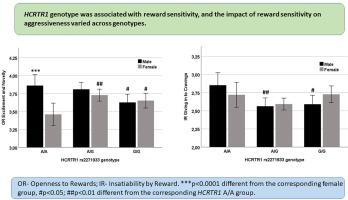Brain Research ( IF 2.9 ) Pub Date : 2020-07-09 , DOI: 10.1016/j.brainres.2020.147013 Aleksander Pulver 1 , Evelyn Kiive 2 , Margus Kanarik 3 , Jaanus Harro 4

|
Orexins/hypocretins maintain wakefulness, increase appetite and participate in the coordination of stress response. We have recently provided evidence on the role of orexins in aggression, showing the association of the HCRTR1 genotype.
(rs2271933 G > A; leading to amino acid substitution Ile408Val) with aggressiveness or breach of law in four independent cohorts. Aggressive behaviour can be reward driven and hence we have examined the association of HCRTR1 rs2271933 genotype with different aspects of reward sensitivity in the birth cohort representative Estonian Children Personality Behaviour and Health Study. HCRTR1 genotype was associated with reward sensitivity in a gender dependent manner. Male HCRTR1 A/A homozygotes had higher Openness to Rewards and the overall reward sensitivity score while, in contrast, female A/A homozygotes scored lower than G-allele carriers in Openness to Rewards. In the total sample, aggressiveness correlated positively with reward sensitivity, but this was on account of Insatiability by Reward. In contrast, the HCRTR1 A/A homozygotes had a positive association of aggressiveness and Openness to Rewards. Experience of stressful life events had a small but significant increasing effect on both aspects of reward sensitivity, and correlated in an anomalous way with reward sensitivity in the HCRTR1 A/A homozygotes. Conclusively, the higher aggressiveness of HCRTR1 A/A homozygotes appears based on a qualitative difference in sensitivity to rewards, in the form that suggests their lower ability to prevent responses to challenges being converted into overt aggression.
中文翻译:

食欲素/hypocretin 受体基因 (HCRTR1) 与奖励敏感性的关联,以及与性别的相互作用。
Orexins/hypocretins 维持清醒,增加食欲并参与压力反应的协调。我们最近提供了关于食欲素在侵略中的作用的证据,显示了HCRTR1基因型的关联。
(rs2271933 G > A;导致氨基酸替换 Ile408Val)在四个独立的队列中具有攻击性或违法性。攻击性行为可以是奖励驱动的,因此我们在出生队列代表爱沙尼亚儿童人格行为和健康研究中检查了HCRTR1 rs2271933 基因型与奖励敏感性不同方面的关联。HCRTR1基因型以性别依赖的方式与奖励敏感性相关。男性HCRTR1A/A 纯合子的奖励开放度和整体奖励敏感性得分较高,而相比之下,女性 A/A 纯合子的奖励开放度低于 G 等位基因携带者。在总样本中,攻击性与奖励敏感性呈正相关,但这是由于奖励的贪得无厌。相比之下,HCRTR1 A/A 纯合子的攻击性和对奖励的开放性呈正相关。压力生活事件的经历对奖励敏感性的两个方面都有微小但显着的增加影响,并以异常方式与HCRTR1 A/A 纯合子的奖励敏感性相关。最终,HCRTR1的更高攻击性 A/A 纯合子的出现是基于对奖励的敏感性存在质的差异,其形式表明它们阻止对挑战的反应转化为公开攻击的能力较低。



























 京公网安备 11010802027423号
京公网安备 11010802027423号